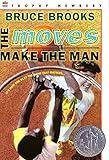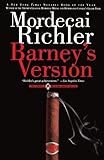The “staff picks” shelf in any good independent bookstore is a treasure trove of book recommendations. Unmoored from media hype and even timeliness, these books are championed by trusted fellow readers. With many former (and current) booksellers in our ranks, we offer our own “Staff Picks” in a feature appearing irregularly.
 The Moves Make the Man by Bruce Brooks recommended by Garth
The Moves Make the Man by Bruce Brooks recommended by Garth
It’s been a long time since I read this 1984 coming-of-age novel, but its indelible images – the green glass of Mello Yello bottles, the soggy crackers used to make home-ec mock-apple pie, the railroad lantern by whose light the protagonists play night games of pickup basketball – remain seared into my memory. Author Bruce Brooks, a graduate of the Iowa Writers Workshop, combines descriptive mastery with the kind of compassion that can’t be taught. His story of an unlikely friendship also complicates some of our cherished myths about race and privilege. Though The Moves Make the Man, a Newbery Honor winner, might be slotted into young adult and sportswriting and Southern lit categories, it is no more a niche work than The Bluest Eye, or A Fan’s Notes, or To Kill a Mockingbird, in whose illustrious company it belongs.
 Barney’s Version by Mordecai Richler recommended by Andrew
Barney’s Version by Mordecai Richler recommended by Andrew
Richler’s final novel, Barney’s Version is a savagely funny piece of satire. It’s also quite moving as it sweeps you through one man’s life. Frank and cantankerous, Barney Panofsky lays bare his failed marriages, his work, and his possible crimes and misdemeanors. Somewhat unreliable as a narrator, Barney’s memories are annotated by his son Michael, who provides clarification and correction to his father’s version of events. Whenever I hear that a film adaptation of a beloved novel is in the works, I usually brace myself for disappointment, but with Paul Giamatti and Dustin Hoffman signed on to play the principal roles, I’m actually looking forward to this one.
 The Strangers and Brothers series by C. P. Snow recommended by Lydia
The Strangers and Brothers series by C. P. Snow recommended by Lydia
This sequence of novels, beginning with A Time of Hope, takes place in England from World War One to the sixties. I haven’t actually finished the series; I’ve only gotten through four out of a possible eleven. I’m a finisher, though, with the exception of Moby Dick on tape, The Alexandria Quartet, and Ulysses (fucking Ulysses, actually), so I am hoping for a completion date sometime before the autumn of my years.
I was overjoyed to learn of the existence of these books. I love novel series, and it is my dream to find another Dance to the Music of Time. Or at least a Forsyte Saga. Or at the absolute least, the one with the cave bears. As it happens, C. P. Snow sits somewhere on the spectrum between Powell and Auel. The books are not nearly so delightful as Dance to the Music of Time, but I am nevertheless enjoying them quite a bit. They relate the life of a middle-class man of limited means, who rises to great heights in several professions. It’s a good chronicle of several English epochs and the attitudes found therein. The subject matter is not always riveting, but the books are quite readable. I realize that this doesn’t exactly sound like a ringing endorsement, but most of the books I love have already been ringing-ly endorsed by someone else, and these are a step or two off the beaten path. So this is me, endorsing.
 The Posthuman Dada Guide by Andrei Codrescu recommended by Anne
The Posthuman Dada Guide by Andrei Codrescu recommended by Anne
Dada wisdom, divined by Andrei Codrescu and dispersed throughout this guide includes: take a pseudonym (or many); embrace spam email as a form of cut-up poetry; and remember that “the only viable Dada is the banished Dada.” Codrescu posits with wit that as creatures of the digital age, whose lives are beholden to IMs, email, iPhones, Google, and Facebook, we have entered a posthuman era where employing Dada’s nonsense actually makes sense. Beginning with an imagined chess game in 1916 Zurich between Dada founder and poet Tristan Tzara and revolutionary Vladimir Lenin, Codrescu traces Dada from its nascence to show how Tzara and his rabble-rousers usurped and altered the course of twentieth-century thought. Dada resists meaning and revels in absurdity, and Codrescu would be the first to acknowledge this book doesn’t provide a list of how-to’s but rather resembles a nautical map that charts the currents of our times. “It is not advisable, nor was it ever, to lead a Dada life,” Codrescu warns. And for that reason alone, you just might want to try it.
 The Magnificent Mrs. Tennant by David Waller recommended by Emily
The Magnificent Mrs. Tennant by David Waller recommended by Emily
How delightful to find a learned book that wears its scholarliness lightly: David Waller’s lovely new biography of the Victorian grande dame and salonniere Gertrude Tennant is such a book. Because the magnificent subject of Waller’s book lived from the end of the age of Jane Austen through the First World War, and lived both in France and in England, her biography offers a sort of intimate history of the nineteenth and early twentieth centuries – its personalities and intellectual and cultural history. The famous and controversial explorer Henry Morton Stanley attended Mrs. Tennant’s salons (the horrors of his expeditions to Africa are thought to have been among Conrad’s models for Heart of Darkness), as did Labor Prime Minister William Gladstone, the famous Victorian painter John Everett Millais, and literary luminaries like Mark Twain, Oscar Wilde, Gustave Flaubert, Victor Hugo, Henry James, Robert Browning, and Ivan Turgenev.
Her acquaintance was a motley of all the aesthetic and intellectual trends of the age: Imperialist explorers, socialists, anarchists, ex-emperors, Romantic and realist novelists, mediums and experts in telepathy all passed through Mrs. Tennant’s drawing room. Her allure as a biographical subject, however, is not limited to her extensive acquaintance: Tennant’s ability to balance her absolute commitments to her husband and children with her gifts for friendship and graciousness and her interest in social and cultural life reveal a more nuanced view of the age, and of the possibilities available to Victorian women. Tennant was a cosmopolitan, a woman of the world, and “an angel in the house” (as the Victorian ideal of wifely and motherly virtue came to be known). Waller trusts Tennant to express herself; he quotes extensively from her diaries and letters. Her voice is earnest, warm, unpretentious, intelligent, loving. You will be glad to have met her. And you will see, through her life, a more refined view of English nineteenth century social and intellectual history.








